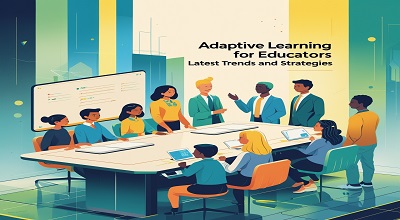Adaptive Learning for Educators
Adaptive learning for educators is an innovative educational approach that uses technology to personalize learning experiences for students. By leveraging artificial intelligence (AI), machine learning (ML), and data analytics, adaptive learning systems adjust content, pace, and assessments based on individual student performance.
For educators, adaptive learning offers a powerful tool to enhance teaching efficiency, improve student engagement, and address diverse learning needs. As classrooms become more digitally integrated, understanding the latest trends in adaptive learning is crucial for modern educators.
How Adaptive Learning Works?
Adaptive learning systems rely on three key components:
A. Data Collection
- Tracks student interactions, responses, and progress.
- Uses quizzes, assignments, and real-time feedback.
B. Algorithmic Adjustments
- AI analyzes performance data to modify lesson difficulty.
- Provides customized learning paths for each student.
C. Personalized Feedback
- Offers instant corrections and explanations.
- Recommends additional resources based on weaknesses.
Benefits of Adaptive Learning for Educators
Adaptive learning provides numerous advantages for teachers:
A. Personalized Instruction
- Caters to individual student needs without manual adjustments.
B. Time Efficiency
- Automates grading and progress tracking.
- Allows teachers to focus on higher-value interactions.
C. Improved Student Outcomes
- Enhances engagement and retention.
- Identifies learning gaps early.
D. Scalability
- Works for small classrooms and large online courses.
Latest Trends in Adaptive Learning
The field of adaptive learning is rapidly evolving. Here are the latest trends:
A. AI-Powered Tutoring Systems
- Chatbots and virtual tutors provide 24/7 assistance.
B. Gamification
- Uses game-like elements to boost motivation.
C. Predictive Analytics
- Forecasts student performance to prevent dropouts.
D. Integration with LMS
- Seamless compatibility with platforms like Moodle and Canvas.
E. Mobile Learning
- Enables learning on smartphones and tablets.
Implementing Adaptive Learning in the Classroom
To successfully integrate adaptive learning, educators should:
A. Choose the Right Platform
- Compare tools like DreamBox, Smart Sparrow, and Knewton.
B. Train Teachers and Students
- Provide workshops on using adaptive software.
C. Monitor Progress
- Use dashboards to track student performance.
D. Combine with Traditional Teaching
- Blend adaptive tech with face-to-face instruction.
Challenges and Solutions
Despite its benefits, adaptive learning faces challenges:
A. High Costs
- Solution: Seek grants or affordable SaaS models.
B. Data Privacy Concerns
- Solution: Use GDPR-compliant platforms.
C. Resistance to Change
- Solution: Demonstrate success through pilot programs.
More Here: AI-Powered Cyber Threats
Future of Adaptive Learning
The future holds exciting possibilities:
- Augmented Reality (AR) and Virtual Reality (VR) for immersive learning.
- Blockchain for secure credentialing.
- Emotion AI to detect student frustration or boredom.
Conclusion
Adaptive learning is transforming education by making it more personalized, efficient, and data-driven. Educators who embrace these tools will stay ahead in the evolving digital classroom.
FAQs
Q1: What is adaptive learning?
A: A tech-driven approach that customizes education based on student performance.
Q2: How does AI help in adaptive learning?
A: AI analyzes data to adjust lessons in real-time.
Q3: Is adaptive learning expensive?
A: Costs vary, but many affordable options exist.
Q4: Can adaptive learning replace teachers?
A: No, it complements teaching by automating repetitive tasks.
Q5: Which subjects benefit most from adaptive learning?
A: Math, languages, and STEM fields see high success rates.
Free Download: Sehoki APK
